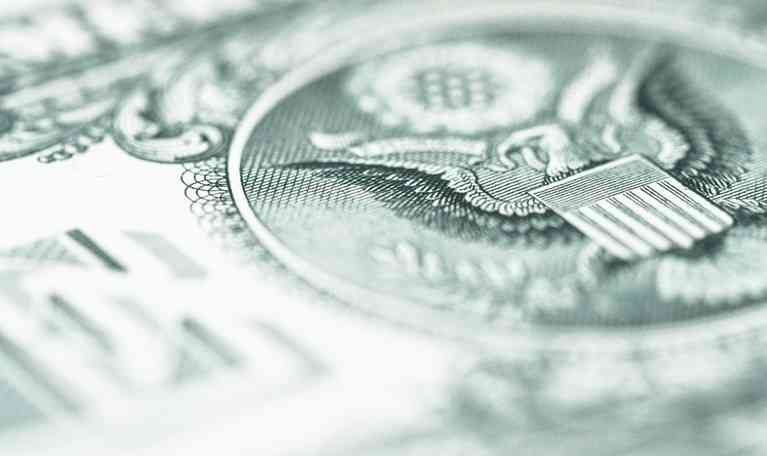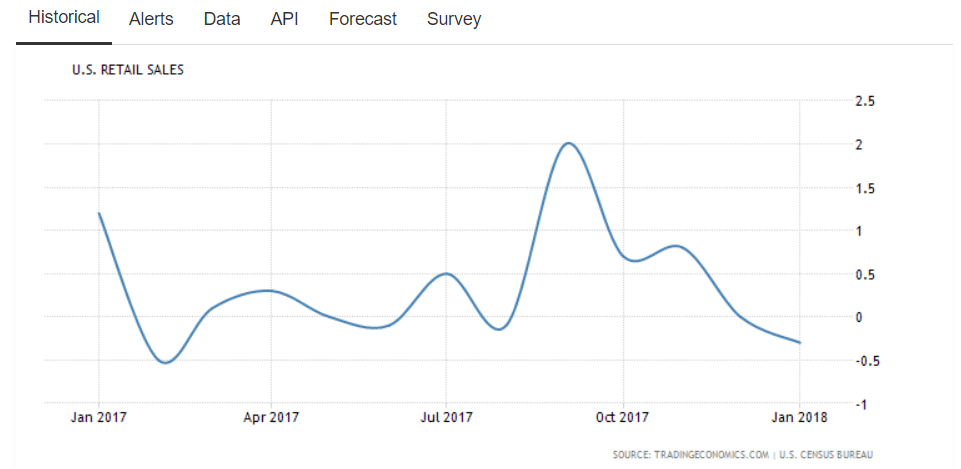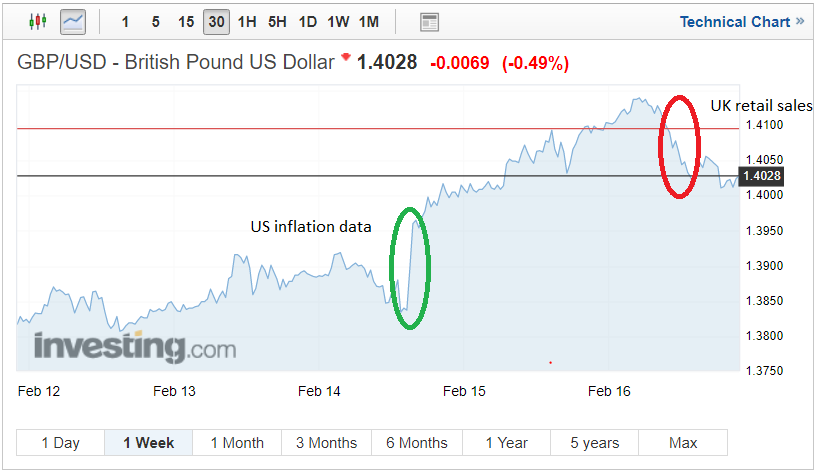The GBP/USD FX rate has experienced volatility with the GBP/USD currency pair fluctuating roughly 1% over the trading week. Key instigators for the weeks GBP/USD FX rate fluctuations included troubling US inflation figures and disappointing UK retail figures; an area which until recently remained buoyant despite the UK’s opaque Brexit outlook.

US economic data was in abundance
Wednesday provided an abundance of US data which included retail sales and crude oil inventories, however, the vast majority of market makers and investors only had a keen eye on the latest US inflation figures. Core US CPI economic data characteristically followed monthly CPI figures with both measures posting higher than forecast numbers.
The FED had forecast this month’s consumer price index to achieve 0.3% growth, this figure showing a significant rise from last month’s 0.1% reaching 0.5% core consumer price index replicated a similar uptrend. The monthly core consumer price index reached 0.3% against an estimated 0.2% also up, achieving the same reading as last month’s reading.
The inflation uptick contrasted the typical currency movement and the dollar weakened dramatically against sterling. Normally, better than expected inflation data figures would bode positively. Especially as the US is relishing the effects of a strong economy and is arguably ripe for an interest rate rise. The FED has confirmed that three rate rises are likely in 2018 although if inflation data continues to rise significantly one would imagine this may force the FED’s hand, becoming a case of necessity rather than choice.
The US retails sales
The dollar’s losses were further compounded with the release of the of the latest US retail sales. Markets had expected an uptick in last months’ results following the forecast being revised down however the latest US retails figures underlined a quiet quarter in US retail.
This month’s forecast was predicted to show 0.5% growth following last months 0.4%, yet despite the previous months forecast being revised down February’s figures highlighted a -0.3% fall and compounded concerns about inflation spiking.
Markets will be concerned about the slowing in retail sales over the last few months. Consumer spending makes up the largest part of the US economy and typically a strong job market, low unemployment and the recent tax cuts should equate to strong consumer consumption. The issue, however, lies in US consumer credit card debt which has increased significantly in 2017. The average American now is encumbered with $6,375 of credit card debt up 3 percent on the year. US credit card debt continues to escalate and now tops $1 trillion, whilst household debt has reached $13.15 in 2017.
Experts now believe that US consumers are becoming more conscious of rising debt and are pairing back their purchases which is clearly being reflected in retail sales.
UK retail sales disappoint – GBP/USD FX rate falls
The GB pound gained significantly against the dollar this week and for the most part avoided any bad runs of data, conservative party take-over coups or Brexit turmoil and for the most part, the GBP/USD FX rate enjoyed being north of 1.40. One key piece of economic data that the UK was due to release was Fridays UK retail sales. It would appear that the UK’s high inflation is continuing to curb consumer appetite. This month’s UK retails sales figure was predicted to reach 0.5% but missed this target reaching just 0.1%.
Areas of retail growth included the gym and fitness sector presumably accelerated by unwanted pounds and new year’s resolutions.
Food sales fell and it is understood that some of the leading UK supermarkets are planning on shedding thousands of jobs.
GBP/USD FX rate – this week’s movements
This week has been proved bittersweet and the majority of the significant GBP/USD movements have been caused by the US rather than UK data. Before the US inflation and retail sales economic data the GBP/USD FX rate was trading at 1.3837 before gaining close to 0.6% and reaching 1.3960. Sterling continued its gradual ascent against the dollar until the release of the latest UK retail sales data. Although the figures showed a significant improvement in the previous months, which were diluted by Black Friday sales, sterling was sold off. At the end of the trading week, GBP/USD closed at 1.4028 falling from a week high of 1.4137.
Week ahead GBP/USD FX rate forecast
The GB pound is now firmly nestled above 1.40 a great physiological level for investors. Many anticipate that the US Dollar will weaken further. The Dow Jones also slipped on Friday which could see investors averting to the dollar. To boot many are also leaving the US bond market which will be reflected in a weaker US dollar.
The GBP/USD pair longer term has the ability to reach 1.43 subject to no Brexit surprises for the UK’s or political turmoil on either side.

